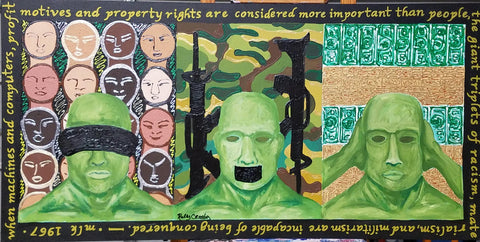Three Evils: Living the Legacy Part III

INSTALLATION #3: THREE EVILS BY KELLY IZDIHAR CROSBY
THE CENTER FOR CIVIL AND HUMAN RIGHTS
SEPTEMBER 6, 2018 TO DECEMBER 31, 2018.
Artist Statement
In our cultural consciousness, Dr. Martin Luther King, Jr. is upheld as a beloved advocate for peace, a social justice icon. In his time, however, he was viewed as a radical, an unpopular provocateur. Towards the end of his life, he was a strident antiwar activist, and speaking against military intervention in Vietnam angered political liberals and conservatives alike. In his speech, Beyond Vietnam: A Time to Break Silence, King states, “When machines and computers, profit motives and property rights are considered more important than people, the giant triplets of racism, materialism, and militarism are incapable of being conquered.”
These powerful words inform Three Evils, which personifies the “triplets of evil,” and encourages the viewer to reflect on modern trends of consumerism and gun violence, and consider the lasting relevance of King’s words 50 years later. As we observe political pundits, policymakers, and corporations use King’s words and likeness in campaign rhetoric and corporate marketing, we should consider whether those that praise him fail to embody his indictments of racism, overconsumption, and empire.
In 1967, Dr. Martin Luther King, Jr. stood before an audience at the Hungry Club in Atlanta and delivered his speech, America’s Chief Moral Dilemma. In it, King stated that America’s moral dilemma rested in three major evils; racism, poverty, and war. While as a country the United States had made strides in racial injustice by ending legal segregation, there was still work to be done.
The Civil Rights Movement needed to evolve according to King and, in the late 1960s, his message expanded to include economic equality. King suggested a guaranteed annual income as a way to end poverty and rid America of this particular evil. While many scoffed at the idea, King pointed out that the cost to provide annual income would not exceed the United States’ expenditure on the war in Vietnam. War, the third evil, was viewed by King as the greatest challenge to mankind. As a clergyman, his faith would neither allow him to participate in war nor encourage it. Many believed that his positions against war and poverty would hurt the Civil Rights Movement, but King refused to remain silent on these issues.
Each of the three evils is violent, not only militarized war, and the phenomena are so frequently interrelated that to resist one is often resisting another. The three evils motif appears both directly and implicitly in several King speeches and appearances in 1967 in particular, demonstrating his broadening perspective and final campaign to connect struggles beyond race and national boundaries.
